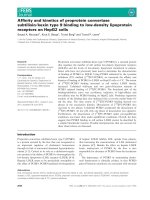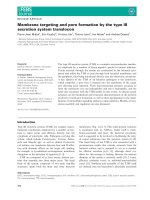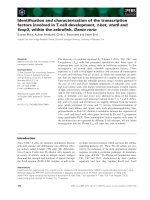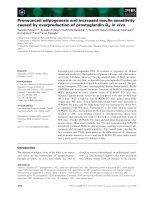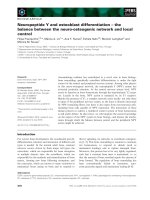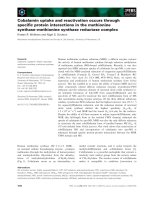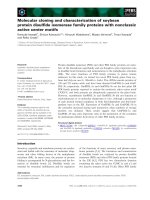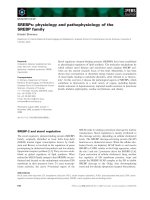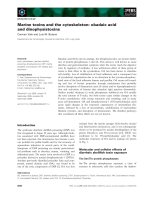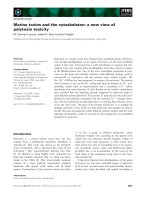báo cáo khoa học: " Methamphetamine use and malnutrition among street-involved youth" potx
Bạn đang xem bản rút gọn của tài liệu. Xem và tải ngay bản đầy đủ của tài liệu tại đây (220.57 KB, 4 trang )
BRIE F REPO R T Open Access
Methamphetamine use and malnutrition
among street-involved youth
Dan Werb
1
, Thomas Kerr
1
, Ruth Zhang
1
, Julio SG Montaner
1,2
, Evan Wood
1,2*
Abstract
We sought to explore the effect of crystal methamphetamine use on the risk of experiencing malnutrition among
street-involved youth in Vancouver, Canada. Risk of malnutrition was defined as being hungry but not having
enough money to buy food. Socio-demographic and drug use factors associated with risk of malnutrition were
investigated using univariate and multivariate analysis among a prospective cohort of street-involved youth known
as the At-Risk Youth Study (ARYS). Between September 2005 and December 2006, 509 street-involved youth were
enrolled in ARYS, among whom 21% reported being at risk of malnutrition as defined above in the previous six
months. In multivariate analysis, only non-injection crystal methamphetamine was significantly associated with
being at risk of malnutrition among this cohort (Adjusted Odds Ratio [AOR] = 1.60, 95% Confidence Interval [CI]:
1.03 - 2.48, p = 0.036). Interventions seeking to address food insecurity among street youth may benefit from con-
sidering drug use patterns since methamphetamine use predicted higher risk in this setting.
Findings
Over the last decade, crystal methamphetamine use has
emerged as a unique and significant public health con-
cern, and data on the prevalence of crystal methamphe-
tamine use have shown that its use is increasing in
North America, particularly among young gay men and
young injection drug users [1,2]. Studies have also
reported that crystal methamphetamine use is associated
with a variety of physiological and neurological disorders
[3], as well as with a number of risk behaviours for HIV
transmission, and that these risks are heightened among
street-involved youth [2]. This is of concern given that
the health of street-involved youth is already often com-
promised by widespread unstable housing and chronic
food insecurity [4].
Little research, however, has been conducted on the
association between patterns of drug use and food
security among youth. Specifically, knowledge gaps exist
concerning the potential unique impact of crystal
methamphetamine use on risks of malnutrition among
street-involved youth populations. We t herefore sought
to explore the effect of crystal methamphetamine use on
the risk of experiencing malnutrition among a cohort of
street-involved youth in Vancouver, Canada.
We evaluated factors associated with malnutrition
among participants enrolled in the At-Risk Youth Study
(ARYS), a prospective cohort of street-involved youth
aged 14 to 26 in Vancouver, Canada, which has been
described in detail previously [5]. In brief, at baseline
and semi-annually, ARYS participants complete an
interviewer-administered questionnaire and provide
blood samples for diagnostic testing. In the present
study, Pearson’s Chi-square t est and multivariate analy-
sis were used to determine factors associated with ever
having experienced malnutrition among this cohort.
Our primary independent variable of interest was crys-
tal methamphetamine use, though we accounted for a
wide array of socio-demographic, drug use and beha-
vioural variables, all of which are shown in Table 1. All
variable definitions were identical to earlier reports from
our setting [6] and all behavioural and drug use vari-
ables refer to behaviours in the previous six months.
We defined the dependent variable based on responses
to the following ARYS survey question: “I am often hun-
gry but I don’t eat because I can’ t afford enough food”.
Respondents answering “ Often true ” or “ Sometimes
true” were defined as bei ng at risk of malnutritio n;
those answering “Never true” were defined as not being
at risk of malnutrition. All tests were two-ta iled and the
significance level was set at p < 0.05. All statistical
* Correspondence:
1
British Columbia Centre for Excellence in HIV/AIDS, St Paul’s Hospital,
Vancouver, Canada
Werb et al. Harm Reduction Journal 2010, 7:5
/>© 2010 Werb et al; licensee BioMed Central Ltd. This is an Open Access article distributed under the terms of the Creative Commons
Attribution License ( g/licenses/by/2.0), which permits unrestricted use, distribution, and reprodu ction in
any medium, provided the or iginal work is properly cited.
analyses were performed using SAS software version 9.0
(SAS, Cary, NC).
In total, 509 youth were recruited into the ARYS study
between September 2005 and December 2006. Among
this cohort, 149 (29%) were women, 154 (30%) were
non-Caucasian, and the median age of participants was
22 years (Interquartile Range [IQR]: 20.0 - 23.9). Over-
all, 105 (21%) individuals reported being at risk of mal-
nutrition in the previous six months.
As shown in Table 1, in univariate analyses, factors
positively associated with being at risk of malnutrition
included age (Odds Ratio [OR] = 1.10, 95% confidence
interval [CI]: 1.01 - 1.19, p = 0.024), non-injection crys-
tal methamphetamine use (OR = 1.62, 95% CI: 1.05 -
2.49, p = 0.027), crack use (OR = 1.68, 95% CI: 1.07 -
2.64, p = 0.024) and injection heroin use (OR = 1.70,
95% CI: 1.04 - 2.80, p = 0.035). Tho se variables that
were found to be non-significant in univariate analyses
(all p > 0.05) are also shown in Table 1.
As shown in Table 2, in multivari ate analysis, only
non-injection crystal methamphetamine use was a sso-
ciated with risk of malnutrition (Adjusted Odds Ratio
[AOR] = 1.60, 95% CI: 1.03 - 2.48, p = 0.036) after
adjustment for all other variables found to be signifi-
cantly associated with being at risk of malnutrition in
univariate analyses.
In the present study, over 20% of participants reported
being at risk of malnutrition in the prior six months as
Table 1 Univariate analysis of factors associated with malnutrition among a cohort of street-involved youth (n = 509)
Being at risk of malnutrition in the
last six months
Characteristic* No (n = 404) Yes (n = 105) Total OR 95% CI p value
Age
Median (and IQR) 21.8 (19.8 - 23.7) .522.7 (20.7 - 24.3) 1.10 (1.01 - 1.19) 0.024
Gender
Male 284 (70.3) 76 (72.4) 360
Female 120 (29.7) 29 (27.6) 149 0.90 (0.56 - 1.46) 0.676
Caucasian ethnicity
No 129 (31.2) 25 (23.8) 154
Yes 275 (68.1) 80 (76.2) 355 1.50 (0.91 - 2.46) 0.107
Injecting in public
No 318 (78.7) 74 (70.5) 392
Yes 86 (21.3) 31 (29.5) 117 1.55 (0.96 - 2.51) 0.074
Requiring help injecting
No 378 (93.6) 97 (92.4) 475
Yes 26 (6.4) 8 (7.6) 34 1.20 (0.53 - 2.73) 0.665
Non-injection crystal methamphetamine use
No 237 (58.7) 49 (46.7) 286
Yes 167 (41.3) 56 (53.3) 223 1.62 (1.05 - 2.49) 0.027
Crack use
No 180 (44.5) 34 (32.4) 214
Yes 224 (55.5) 71 (67.6) 295 1.68 (1.07 - 2.64) 0.024
Injection crystal methamphetamine use
No 334 (82.7) 78 (74.3) 412
Yes 70 (17.3) 27 (25.7) 97 1.65 (0.99 - 2.75) 0.051
Injection heroin use
No 330 (81.7) 76 (72.4) 406
Yes 74 (18.3) 29 (27.6) 103 1.70 (1.04 - 2.80) 0.035
Injection cocaine use
No 364 (90.1) 96 (91.4) 460
Yes 40 (9.9) 9 (8.6) 49 0.85 (0.40 - 1.82) 0.681
Non-injection opiate use
No 382 (94.6) 96 (91.4) 478
Yes 22 (5.5) 9 (8.6) 31 1.63 (0.73 - 3.65) 0.233
Note: CI = Confidence Interval; IQR = Interquartile Range
*All drug use variables were defined as ever in the last six months.
Werb et al. Harm Reduction Journal 2010, 7:5
/>Page 2 of 4
defined as often being hungry but not having enough
money to buy food. In multivariate analysis, and despite
intensive adjustment for a range of drug use, beha-
vioural and socio-demographic factors, only non-injec-
tion crystal methamphetamine use was independently
associated with being at risk of malnutrition.
These findings may reflect a unique risk of malnutri-
tion associated with crystal methamphetamine use
among street-involved youth. While past studies on
crystal methamphetamine use among street-involved
and gay male youth populations have reported an asso-
ciation between use of this drug and risk behaviours
associated with the transmission of HIV and other
blood-borne diseases [2,7], we believe our study is the
first to identify crystal methamphetamine use as a
potential determinant of malnutrition. Our findings
indicate that interventions focussed primarily on the risk
of HIV transmission and the neuropsychological effects
of use of this drug among youth [8] may need to be re-
evaluated in order address the broad er impact of crystal
methamphetamine use on a wider variety of health
determinants, such as malnutrition. Similarly, the impact
of interventions aimed exclusively at increasing food
security and improving malnutrition among street-
involved youth may be limited without the incorporation
of components aimed at reducing crystal methampheta-
mine use.
Studies have shown that supply reduction strategies in
the United States aimed at disrupting small-scale produ-
cers of crystal methamphetamine within the country
have largely failed to stem an increase in rates of crystal
methamphetamine use [9]. Consequently, evidence-
based interventions focussing on demand reducti on and
other adverse health sequelae of c rystal methampheta-
mine use must be developed.
Although the ARYS study is not a rando m sample, all
cohort studies of high-risk or marginalized populations
generally suffer from this limitation s ince there are
rarely registries from which to draw random samples.
As well, our data was based on self-report and could
therefore have resulted in socially desirable reporting
[10], which may have consequently lowered reported
rates of illicit drug use [11]. However, we know of no
reason why risks of malnutrition would be differentially
reported by methamphetamine users and non-users.
In summary, over one-fifth of our cohort reported being
at risk of malnutrition in the previous six months as
defined by not having enoug h money to buy food, and in
multivariate analysi s only non-injection crystal metham-
phetamine use was independently associated with this pro-
blem. This finding suggests that the impact of current
health and preventive interventions aimed at addressing
issues surrounding either crystal methamphetamine use or
malnutrition among street-involved youth may be limited
without taking into account the relationship between
these health behaviours. Finally, further prospective and
qualitative research is needed into the potential role of
crystal methamph etamine use in mediating food security
among this population, and prospective study will be
required to examine the long term impact of crystal
methamphetamine on nutrition-related health outcomes.
Acknowledgements
We would particularly like to thank the ARYS participants for their
willingness to participate in the study. We also thank John Charette, Amir
Abubaker, Trevor Logan, and Steve Kain for their research assistance, and
Deborah Graham, Jo-Anne Stoltz, Carley Taylor, and Peter Vann for their
administrative assistance.
The ARYS cohort is supported by the US National Institutes of Health (RO1
DA11591) and the Canadian Institutes of Health Research (122258). Thomas
Kerr is supported by the Michael Smith Foundation for Health Research and
the Canadian Institutes for Health Research.
Author details
1
British Columbia Centre for Excellence in HIV/A IDS, St Paul’s Hospital,
Vancouver, Canada.
2
Department of Medicine, Faculty of Medicine, University
of British Columbia, Vancouver, Canada.
Authors’ contributions
DW and EW drafted the original manuscript and initiated the design of the
study. RZ performed the statistical analyses. TK and JM participated in the
design of the study and participated in substantial revisions of the
manuscript. All authors read and approved the final manuscript.
Competing interests
DW, TK and EW have no conflicts of interest to declare. JM has received
grants from, served as an ad hoc adviser to, or spoken at events sponsored
by Abbott, Argos Therapeutics, Bioject Inc., Boehringer Ingelheim, BMS,
Gilead Sciences, GlaxoSmithKline, Hoffmann-La Roche, Janssen-Ortho, Merck
Frosst, Panacos, Pfizer Ltd., Schering, Serono Inc., TheraTechnologies, Tibotec
(J&J), and Trimeris.
Received: 26 November 2008
Accepted: 8 March 2010 Published: 8 March 2010
Table 2 Multivariate analysis of factors associated with
being at risk of malnutrition among a cohort of street-
involved youth (n = 509)
Characteristic* Adjusted Odds Ratio (95% CI) p value
Non-injection crystal
methamphetamine use
Yes vs. No 1.60 (1.03 - 2.48) 0.036
Age
≤ 22 years vs. > 22 years
old
1.07 (0.99 - 1.17) 0.097
Crack use
Yes vs. No 1.44 (0.90 - 2.31) 0.125
Injection heroin use
Yes vs. No 1.41 (0.84 - 2.36) 0.193
Note: CI = Confidence Interval
*All drug use variables were defined as ever in the last six months.
Werb et al. Harm Reduction Journal 2010, 7:5
/>Page 3 of 4
References
1. Boddiger D: Metamphetamine use linked to rising HIV transmission.
Lancet 2005, 365(9466):1217.
2. Fairbairn N, Kerr T, Buxton JA, Li K, Montaner JS, Wood E: Increasing use
and associated harms of crystal methamphetamine injection in a
Canadian setting. Drug and Alcohol Dependence 2007, 88(2/3):313.
3. Urbina AJK: Crystal methamphetamine, its analogues, and HIV infection:
medical and psychiatric aspects of a new epidemic. Clinical infectious
diseases Chicago, IL: The University of Chicago Press 2004, 38:890.
4. Dachner N, Tarasuk V: Homeless “squeegee kids": Food insecurity and
daily survival. Social science & Medicine 2002, 54:1039.
5. Wood E, Stolz J-A, Montaner JSG, Kerr T: Evaluating methamphetamine
use and risks of injection initiation among street youth: The ARYS study.
Harm Reduction Journal 2006, 3(18):1.
6. Wood E, Tyndall MW, Spittal PM, Li K, Kerr T, Hogg RS, Montaner JS,
O’Shaughnessy MV, Schechter MT: Unsafe injection practices in a cohort
of injection drug users in Vancouver: Could safer injecting rooms help?.
Cmaj 2001, 165(4):405.
7. Schilder AJ, Lampinen TM, Miller ML, Hogg RS: Crystal methamphetamine
and ecstasy differ in relation to unsafe sex among young gay men.
Canadian Journal of Public Health 2005, 96(5):340.
8. Crystal meth and other amphetamines: An integrated BC strategy.
Victoria: Minister of State for Mental Health and Addiction Services 2004.
9. Cunningham JK, Liu L: Impacts of federal ephedrine and
pseudoephedrine regulations on methamphetamine-related hospital
admissions. Addiction 2003, 98(9):1229.
10. Fendrich M, Xu Y: The validity of drug use reports from juvenile
arrestees. International Journal of Addiction 1994, 29(8):971.
11. Mensch BS, Kandel DB: Underreporting of substance use in a national
longitudinal youth cohort: Individual and interviewer effects. Public
Opinion Quarterly 1988, 52(1):100.
doi:10.1186/1477-7517-7-5
Cite this article as: Werb et al.: Methamphe tamine use and malnutrition
among street-involved youth. Harm Reduction Journal 2010 7:5.
Submit your next manuscript to BioMed Central
and take full advantage of:
• Convenient online submission
• Thorough peer review
• No space constraints or color figure charges
• Immediate publication on acceptance
• Inclusion in PubMed, CAS, Scopus and Google Scholar
• Research which is freely available for redistribution
Submit your manuscript at
www.biomedcentral.com/submit
Werb et al. Harm Reduction Journal 2010, 7:5
/>Page 4 of 4
